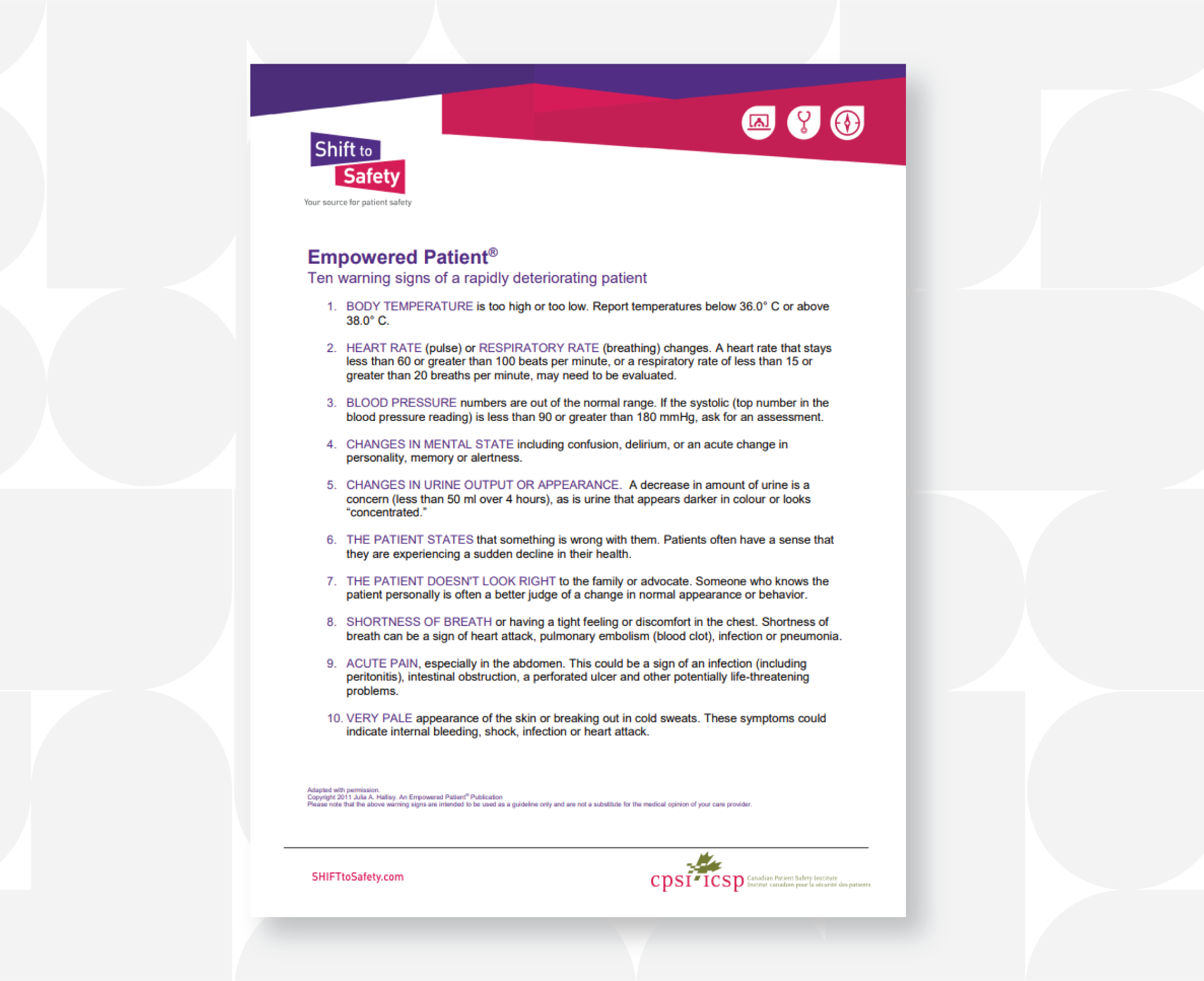Public: Deteriorating Patient Condition
Recognizing Deteriorating Patient Condition – what the public needs to know
Family members are a vital part of the healthcare team and are often best positioned to recognize the sometimes subtle, yet very important changes in their loved one's condition that may indicate deterioration. You may not know what is wrong, but you know something just isn't right.
Empower yourself and your loved ones with the following information and resources. They will both help you recognize the signs of deteriorating patient condition, and effectively discuss your concerns with the healthcare provider.
Top 10 warning signs of a rapidly declining patient
Understanding the basics of deteriorating patient condition
Early warning signs of deteriorating condition are often unrecognized, leading to devastating results. Research shows that virtually all critical inpatient events are preceded by warning signs that occur approximately six-and-a-half hours in advance.

Top 10 warning signs of a rapidly declining patient
To begin, familiarize yourself with the Top 10 Warning Signs of a Rapidly Declining Patient. Feel free to share this resource, print it for future reference or save it to your phone.

Top 10 warning signs of a rapidly declining patient
To begin, familiarize yourself with the Top 10 Warning Signs of a Rapidly Declining Patient. Feel free to share this resource, print it for future reference or save it to your phone.
Some of the more common causes of rapid clinical deterioration are newborn jaundice – a yellowish discoloration in a newborn baby's skin and eyes; heavy bleeding after birth (post-partum haemorrhage); and sepsis. Click on the above links to learn more about signs and symptoms of these disease processes.
What to do if you think someone's condition is deteriorating
If you note any changes in your loved one's condition, go to the hospital, or if in hospital, notify your healthcare team. It's okay to ask questions. It's also okay to ask for a second opinion. If you're concerned about how to speak up or escalate your concerns to members of the healthcare team, these phrases, referred to as CUS, may help:
- I am concerned about my loved one's condition.
- I am uncomfortable with my loved one's condition.
- I believe the safety of my loved one is at risk.
Some organizations may have a rapid response team process when a patient's condition begins to deteriorate, including one that may be patient or family activated. Inquire about these resources with your healthcare provider at any time.
If you are a parent, you may as well find these resources from Alberta Health Services Family and Community Resource Center helpful.
Additional resources you may find helpful in navigating and understanding your role as a valued member of the healthcare team include:
- Safety Is Personal Partnering with Patients and Families for the Safest Care, National Patient Safety Foundation (2014)
- Partnering with Patients to Enhance Safety and Quality, Institute for Patient- and Family-Centered Care (nd)
- Engaged Patients, Empowered Patient Coalition (2022)
- Patient, Family and Caregiver Engagement, Healthcare Excellence Canada (nd)
Are you a provider or a leader? Please share these resources with your patients! We also offer Deteriorating Patient Condition resources specific to providers and leaders.
All of these tools, resources and information was assembled/curated by Healthcare Excellence Canada in partnership with the Healthcare Insurance Reciprocal of Canada and Patients for Patient Safety Canada.
For more information, contact us at info@hec-esc.ca.